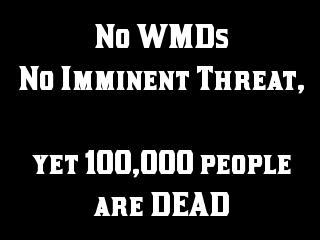Bush called the fallen Marines a "grim reminder" that America is still at war.

Pressure on Bush to
Find an Exit Strategy
By Tom Raum
The Associated Press
Friday 05 August 2005
Washington - The deadly recent attacks on American troops in Iraq are increasing the pressure on President Bush to develop an exit strategy. The US death toll from the war is now over 1,800, and a new AP-Ipsos poll shows the lowest approval yet for Bush's handling of Iraq, just 38 percent.
The president's fellow Republicans are growing nervous as they head into an election year.
Yet the administration must also confront the possibility that a US drawdown of troops - tentatively planned to begin next spring - could further embolden the insurgents and throw Iraq into civil war.
"We will stay the course. We will complete the job in Iraq," Bush pledged anew during a news conference on his Texas ranch with Colombian President Alvaro Uribe.
Bush suggested his resolve was only strengthened by a videotaped warning earlier Thursday from al-Qaida's second-in-command, Ayman al-Zawahri, threatening more terror attacks in Britain and tens of thousands of US military deaths if the United States doesn't withdraw.
There has been little outward sign of progress in US-led efforts to defeat the insurgency and to beef up the Iraqi army and police so they can take over security responsibilities and allow an orderly withdrawal of American forces.
Particularly lethal bombings over the past few weeks, including a roadside bomb that claimed the lives of 14 Marines on Wednesday, have made the situation look even bleaker than US military experts suggest it is.
That translates into a continued erosion of public support for Bush's Iraq policy at home.
An AP-Ipsos poll taken Monday through Wednesday indicated that just 38 percent of Americans approve of Bush's handling of Iraq. A year ago, the public was evenly divided on Iraq, and Bush's stance on the war and terrorism helped him to election victory.
Bush has lost support most dramatically among younger women, especially those who live in the suburbs, and among men with a high school education or less.
Despite the horrific headlines, many military analysts say that attacks on US troops have actually remained constant in recent weeks while attacks on Iraqi civilians have increased.
"As tragic as they are, they don't establish a pattern that says US casualties are getting consistently worse," said Anthony H. Cordesman, an Iraq expert and former Pentagon intelligence official. He attributed recent deaths of Marines to the fact that "these are more aggressive military patrols going into hostile areas."
Even so, Bush faces a real dilemma, said Cordesman, now with the Center for Strategic and International Studies. "The president's legacy, if he fails in Iraq, historically is an absolute disaster. President Bush and the Bush administration can scarcely ignore that problem."
"If you pull out troops too quickly now, and you see the situation in Iraq collapse before the midterm elections, the impact is going to be far more serious than if you keep the troops in at reasonable levels," Cordesman said.
Regardless of whether attacks against US troops are increasing overall or remaining constant, the deaths over the past few days of Marines in western Iraq - including multiple losses for the community of Brook Park, Ohio - underscore that things in Iraq are not going well.
Jeff Mers, commander of a VFW post that has raised money and sent care packages to the Columbus-based Marine company that suffered the heaviest losses, said that even before this week's attacks, he and other veterans were dazed from attending funerals.
"I think I've been to nine of these just in central Ohio in the past few months," he said.
Bush called the fallen Marines a "grim reminder" that America is still at war.
The war will be a major factor in the 2006 midterm congressional races and could be one in the 2008 presidential race, said Stephen Cimbala, a Pennsylvania State University political scientist who has studied the impact of wars on American politics.
"If you look at it from a Republican point of view, by the 2006 congressional elections, you're going to want to have a timetable in place for withdrawal of US forces and their replacement by Iraqis. And by the fall of 2008, you will want to have most US forces out of there," Cimbala said.




0 Comments:
Post a Comment
<< Home